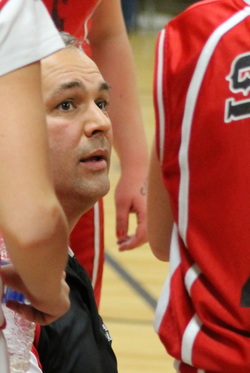
“Grace is fabulous!” her basketball coach told me after one of the state tournament games last week. “She is playing so well and I am so pleased with her.” The light in his eyes testified that he sincerely believed what he was saying.
I tried to give him the credit, telling him that he had taught her everything she knows about basketball—which is very true—but he would not have it. “No,” said he. “She is a hard worker, she listens to me and she does what I ask her to do. She has earned her place on this team.”
His comment caused me to reflect on Grace’s basketball career……and on life.
Last year, as a 7th grader, she tried out for the team never having dribbled a basketball; she had almost no basketball knowledge and absolutely no basketball skills. She made the team as a non-player; the coach told her that she could practice with the team but that she would not dress for nor play in the games. She accepted his conditions and thus began her basketball career.
She practiced lots and played little. The coach ended up letting her dress for the games and, when the team was 30 or so points ahead, he even let her play a little. And thus ended her seventh grade year.
And thus started her 8th grade year. She made the team without conditions but her playing time during games was still very conditional—conditional on the score. If SAA were winning by a large margin, Grace saw court time; if the score was close at all, Grace warmed the bench.
Apparently, however, she did more than warm the bench in practice because gradually things began to change. She saw more playing time….and then more playing time. With a small handful of games left on the schedule, Grace made the starting lineup. And then, during the last two games of the state tournament, Grace never left the floor; she played the entire game.
“She earned her spot on the team,” the coach had said. “She listens to me and does what I tell her to do.” In other words, Grace was coachable.
Coachability is critical in athletics. My father-in-law (who was an Olympic coach for the 1996 Summer Games) and my brother (who is a wrestling coach that competes against Olympia) have both said that an athlete’s receptiveness to coaching is a greater factor in his or her success than is natural talent. To improve and to excel, an athlete must be willing to listen to the coach and then follow instructions.
I think coachability is critical outside of athletics as well. To improve and to excel, people must be willing to listen and learn from others who have experienced success, people who know how to get where they want to go. Mentors are magnificent and, in most cases, mandatory if one truly wants to succeed.
On the flip side, athletes, academicians, and average Anthonys who refuse coaching sideline themselves. “I know!” we say, in response to suggestions. “I know.” But do we know? And do we do what we know? Probably not or we would not be receiving coaching. And do we get where we want to go? Probably not as effectively, if we make it at all.
As I pondered coachability in general and my willingness to be coached in particular, my thoughts wandered to my God.
God should be my Coach. There are similarities between the Lord and a coach. Both know more than I do; both have my best interest at heart; both know how to get where I want to go. Sadly, some athletes worship their coaches as if they were God and some coaches seem to confuse themselves with God as well, but that is beside the point. The point is that, considering how high the stakes are in this game we call life, God is a great coach.
Am I coachable? Do I listen to God? Do I do what He asks me to do? Or do I insist that I know best and stubbornly persist doing things my way?
I think that, too often, we are so determined NOT to be like everyone else—whom we perceive to be stereotypical, mindless followers—that we battle against God’s coaching and, in so doing, become exactly what we did not want to be—just like everyone else because most people are also rejecting God’s coaching.
“I’m my own person.”
“I do my own thinking.”
“Nobody tells me what to do.”
“That’s just the way I am.”
Rejecting God’s coaching is not unique. People have been doing it for centuries. Millennia even. Since the beginning of time actually.
The good news is that people have also been accepting God’s coaching for centuries. Millennia even. Since the beginning of time, actually. We (you and I) accepted God’s coaching in our pre-Earth lives; we know we did because we are here now. And now, here, we have additional opportunities to progress, to succeed and that progress, that success, will come as we continue to listen to Him and to do what He asks us to do; as we continue to be coachable.
Christ was perfectly coachable. “I came into the world to do the will of my Father, because my Father sent me.” (3 Nephi 27:13) Christ did the will of the Father; He listened and He did what His Father asked Him to do. We must do the same. Like Christ, we must listen to the Father and do what He asks us to do. Our task is not the same as Christ’s—we will not be asked to take upon us the sins of the world—but, like Christ, we have a task. It is up to us to seek the Father’s will, to listen to His counsel, and to do what He asks us to do. We must be coachable. And, if we do, we will be given a spot on His team—complete with plenty of playing time and excellent retirement benefits!!!!
Go Team!!!!
Love,
Teresa

 RSS Feed
RSS Feed
